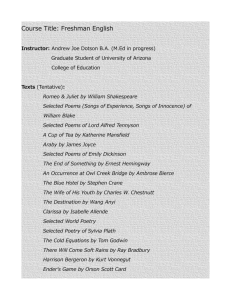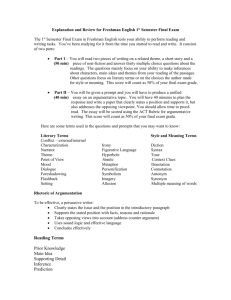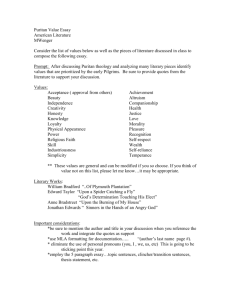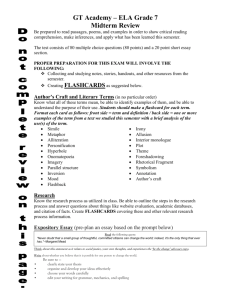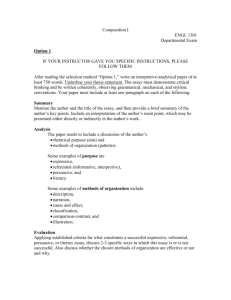World Literature II Final Exam Review Guide
advertisement
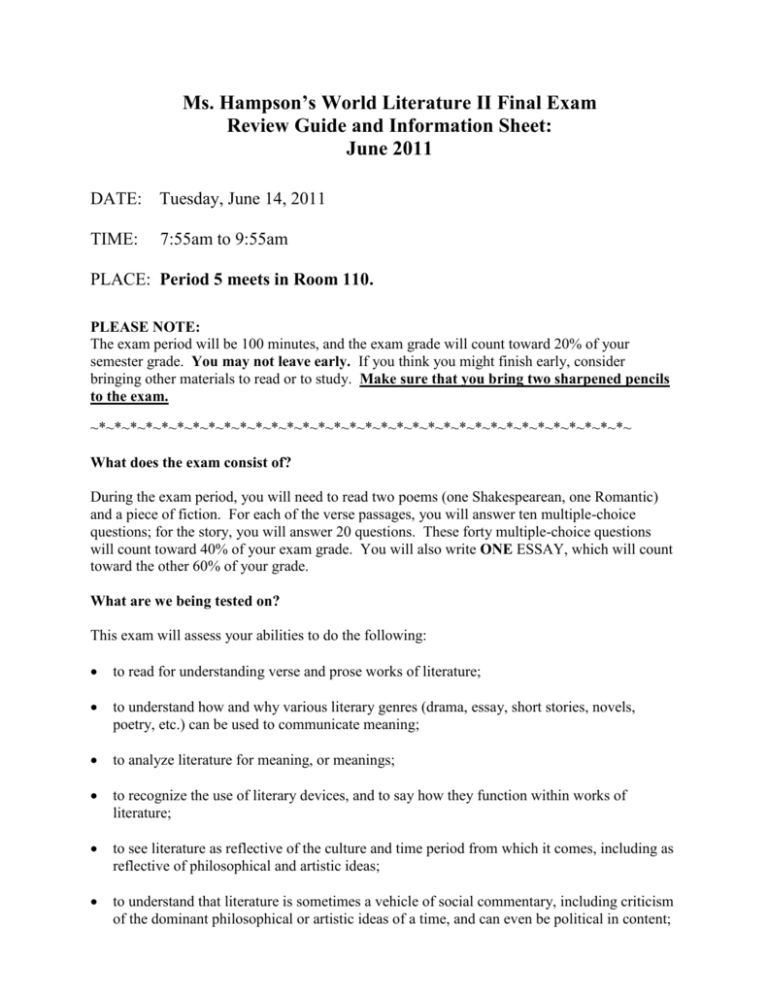
Ms. Hampson’s World Literature II Final Exam Review Guide and Information Sheet: June 2011 DATE: Tuesday, June 14, 2011 TIME: 7:55am to 9:55am PLACE: Period 5 meets in Room 110. PLEASE NOTE: The exam period will be 100 minutes, and the exam grade will count toward 20% of your semester grade. You may not leave early. If you think you might finish early, consider bringing other materials to read or to study. Make sure that you bring two sharpened pencils to the exam. ~*~*~*~*~*~*~*~*~*~*~*~*~*~*~*~*~*~*~*~*~*~*~*~*~*~*~*~*~*~*~*~*~*~*~ What does the exam consist of? During the exam period, you will need to read two poems (one Shakespearean, one Romantic) and a piece of fiction. For each of the verse passages, you will answer ten multiple-choice questions; for the story, you will answer 20 questions. These forty multiple-choice questions will count toward 40% of your exam grade. You will also write ONE ESSAY, which will count toward the other 60% of your grade. What are we being tested on? This exam will assess your abilities to do the following: to read for understanding verse and prose works of literature; to understand how and why various literary genres (drama, essay, short stories, novels, poetry, etc.) can be used to communicate meaning; to analyze literature for meaning, or meanings; to recognize the use of literary devices, and to say how they function within works of literature; to see literature as reflective of the culture and time period from which it comes, including as reflective of philosophical and artistic ideas; to understand that literature is sometimes a vehicle of social commentary, including criticism of the dominant philosophical or artistic ideas of a time, and can even be political in content; to write about literature clearly and effectively in essay form; to demonstrate effective control of writing skills, allowing you to communicate clearly and with style. How can I study for this exam? To prepare for the exam, you should review your notes from this semester, along with evaluations (tests, quizzes, essays and so on). This review will allow you to call to mind what we’ve covered in class as well as your personal performance on evaluations. Considering both of these things is essential preparation. While the exam focuses on skills learned – not content – the third essay option does ask that you discuss another work you read this semester. If you choose to answer question (and keep in mind that it is the only option that doesn’t involve discussing poetry), then you should be able to discuss literary works with specificity. You should, for example, be able to call to mind the exact plot as well as character names. This packet contains some materials for you to consider. Since you will be faced with new poems on the exam, it will be helpful to experience new poems now. Consider what each poem means and how poetic devices help convey meaning. Practice Shakespearean poems as well as Romantic ones. In class we will discuss connections among various literary works; between poems; between poems and stories; and between stories and other literary works we’ve read this semester. Since the essay question involves such comparison, this sort of thinking will also help you prepare. Ask yourself what connections you can make. Make sure that you consider your timed writing skills and performance. Spend time planning before you begin writing. In your essay state your direct and specific answer to the essay question. Maintain that focus throughout your essay, as you support your thesis with specific points and references to the literary works under discussion. End with a conclusion in which you re-assert your thesis. What did we read this semester? This semester we studied literature from the Middle Ages to the present. List what you read from each of the following periods: from the Middle Ages: from the Renaissance: from Rationalism or the Age of Reason and Satire: from Romanticism: from Realism to present: Review of Important Literary Terms 1) Inference 2) Speaker 3) Imagery 4) Simile 5) Metaphor 6) Alliteration 7) Apostrophe 8) Irony 9) Sonnet 10) Quatrain 11) Couplet 12) Octave 13) Sestet 14) Volta 15) Iambic Pentameter 16) Personification 17) Satire 18) Onomatopoeia 19) Hyperbole 20) Mood 21) Tone 22) Foreshadow 23) Narrative 24) Rhyme Scheme 25) Alternating Rhyme 26) Lines of Verse 27) Synonymous 28) Paradox 29) Context 30) Theme
